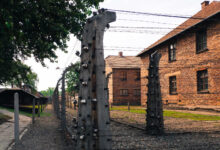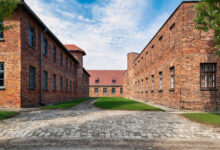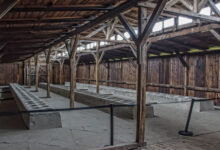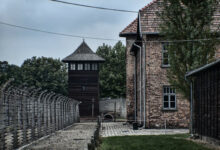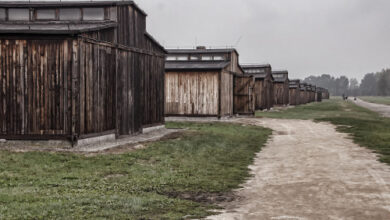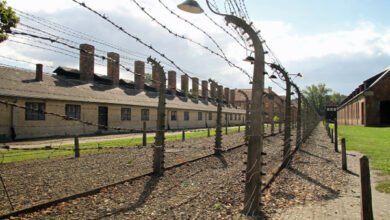Arbeit Macht Frei Meaning
The Dark History Behind the Words: What Does "Arbeit Macht Frei" Really Mean?
The phrase “Arbeit macht frei” carries a heavy historical burden, starkly contrasting its ostensibly positive meaning with the tragic context in which it is most famously associated.
Translated from German, it reads “Work sets you free” or “Work makes one free”. Originally found in an 1873 novel by Lorenz Diefenbach, it was adopted during a period of significant unemployment in early 1930s Germany as a motto to inspire hope and the virtue of hard work.
However, the slogan became infamously linked to the atrocities of the Nazi regime. It was displayed at the entrances of Auschwitz and several other Nazi concentration camps during World War II.
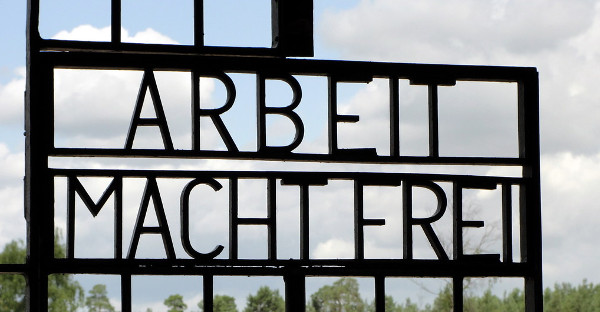
At these sites, the phrase was a cynical manipulation, a false promise of freedom through labour to prisoners who faced inhuman conditions, forced labour, and, for many, ultimate extermination. This misuse turned “Arbeit macht frei” into a lasting symbol of deceit and the horrors of the Holocaust.
As you learn about this phrase, you confront the sombre reality of its historical context. The sign at Auschwitz I, for instance, stands as a poignant reminder of the suffering endured by millions and the grotesque perversion of the original hopeful sentiment behind the words.
Understanding the origins and implications of “Arbeit macht frei” is crucial in remembering one of the darkest chapters in human history.
Table of Contents:
Historical Context of ‘Arbeit Macht Frei’
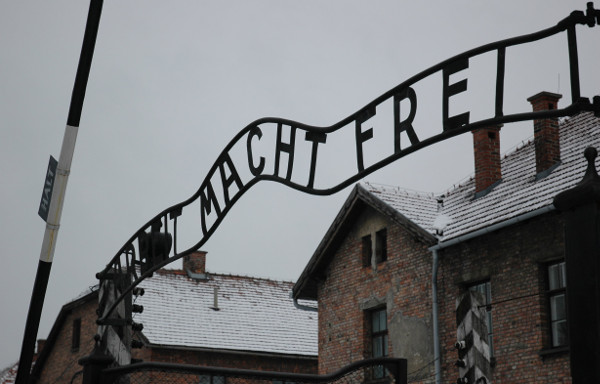
You’ll discover the chilling transformation of a phrase from literature to a symbol of deception and cruelty during the Nazi era.
Origins of the Phrase
The phrase ‘Arbeit macht frei’ translates to ‘Work sets you free’ and finds its origins in the 19th-century cultural context. It was popularised by the 1873 novel of German author Lorenz Diefenbach, where it was used in a more benign setting to convey the idea that spiritual and moral improvement could be achieved through labour.
Nazi Adoption and Usage
During the Nazi regime, ‘Arbeit macht frei’ was co-opted and grotesquely displayed at the entrances of several concentration camps, including Auschwitz. The slogan became bitterly ironic as the forced labour in the camps was inhumane and certainly not a path to freedom.
The Nazis used it cynically to suggest that prisoners could earn their freedom through hard work, which was a stark distortion of reality given the true purpose and conditions within these camps.
Physical Manifestation and Symbolism
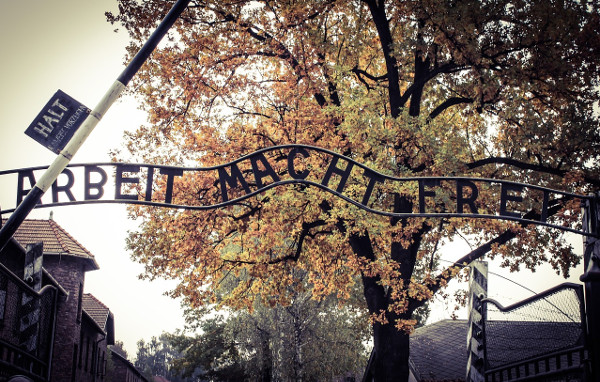
The phrase “Arbeit macht frei” became ominously iconic as it adorned the gates of Nazi concentration camps during the Holocaust, representing a cruel irony for the prisoners of these camps.
Its physical presence at these sites evolved into a stark symbol of the deception and inhuman conditions awaiting the internees within.
Auschwitz I Main Gate
The archway at the main entrance to Auschwitz I prominently displayed the “Arbeit macht frei” inscription. This gate has become one of the most recognisable elements of the camp, symbolising the false promise of freedom through labour.
Here, the inscription was intended to psychologically manipulate prisoners into believing that hard work could result in their release. However, the reality for most was tragically different.
Usage in Other Camps
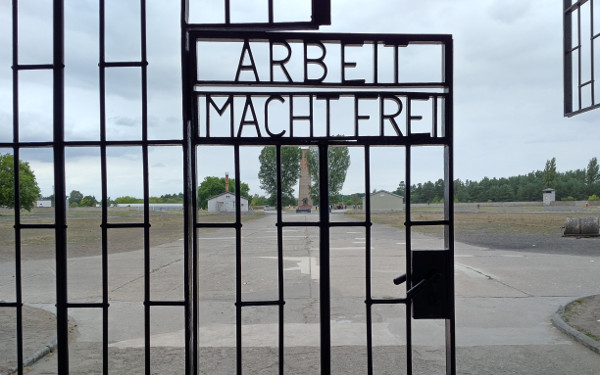
The notorious slogan was not exclusive to Auschwitz. It appeared at the entrances of several other camps, including:
- Dachau: The site of the first Nazi concentration camp.
- Theresienstadt: A camp cum ghetto that also utilized the phrase.
- Sachsenhausen: Positioned just north of Berlin.
- Flossenbürg: A camp in Bavaria.
In these camps, the gates bearing “Arbeit macht frei” stood as physical embodiments of the systematic deception perpetrated by the Nazis.
They falsely suggested a path to liberty, thus compounding the mental torture of detainees, who soon realised that the message bore no truth.
Psychological Impact on Prisoners

The phrase “Arbeit macht frei”, which translates to “Work sets you free”, carried significant psychological implications for the prisoners of Nazi concentration camps. It represented a cruel manipulation, twisting the value of work into a mechanism of deceit and despair.
False Promises of Freedom
“Arbeit macht frei” was emblazoned at the entrances of several Nazi camps, including Auschwitz and Dachau. To you, a prisoner entering the camp, this message was a bitter irony.
The phrase promised freedom through labour, but in the twisted reality of these camps, freedom was often only granted by death. The work you were subjected to was not a path to liberation but a component of a merciless system designed to exploit and eventually lead to the murder of countless individuals.
Work and Exhaustion
Work in the camps would have been gruelling—a relentless cycle intended to wear you down physically and psychologically. Every day would bring extreme exhaustion, while the grim realisation set in that the work would not lead to the freedom but rather was part of the systematic murder process of the Holocaust.
This realisation contributed to an overwhelming sense of hopelessness among the prisoners and served as one of the many tools used by the Nazis to break their spirits and resolve.
Post-War Perception and Legacy
After the atrocities of the Holocaust, the phrase “Arbeit macht frei” has come to symbolise the cruelty and deception employed by the Nazis at their concentration camps. Your understanding of this period is deepened by the continued impact of these three notorious words.
Memorialisation and Education
At the site of former concentration camps, such as Auschwitz, you’ll find “Arbeit macht frei” inscribed at their entrances. These sites have been transformed from places of immense suffering into educational resources.
For instance, the State Museum at Auschwitz preserves these grim reminders of the past, educating you and others about the horrors of the Holocaust. The gate bearing this motto serves as a stark teaching tool, conveying the perverse irony of the message given the reality faced by the prisoners.
Read also:
Controversies and Theft Incidents
The phrase and its associated memorials have not been free from controversy. In December 2009, the infamous “Arbeit macht frei” sign at the Auschwitz camp was stolen. This heinous act was perpetrated by a Swedish neo-Nazi, drawing global condemnation and raising concerns about the persistence of such ideologies.
Subsequently, the original sign was recovered and a replica now stands in its place to prevent further incidents. These thefts and associated vandalism at other sites like Dachau reiterate the need for continued vigilance in the preservation of these memorials and the education they support.
Notable Personal Accounts and Testimonies
You will find an unsettling contrast in the accounts of survivors and the reports from SS personnel regarding the phrase “Arbeit macht frei”.
These stories provide chilling insights into the experiences within the Nazi concentration camps, such as Auschwitz, which was comprised of Auschwitz I (the main camp), Birkenau (Auschwitz II), and Monowitz (Auschwitz III).
Survivors’ Stories
Survivors’ testimonies offer haunting recollections of how the promise held by “Arbeit macht frei” inscribed at the entrances of camps like Auschwitz I betrayed a grim reality.
Many Jewish survivors recount the psychological torture incurred upon seeing the sign, which stood in stark opposition to the true purpose of the places it adorned.
- Primo Levi: A prominent Italian Jewish survivor, Levi described the sign as a cruel mockery, highlighting the lethal futility of the labour endured by inmates.
- Elie Wiesel: His memoirs document the harrowing experiences he and his fellow prisoners faced, underscoring that “work” did not, in fact, grant freedom but led to unspeakable suffering and death.
SS Personnel Accounts
On the other hand, accounts from SS personnel, including testimonies during post-war trials, offer a different perspective. The Schutzstaffel (SS), under which the camp guards operated, facilitated the brutal regime of the camps.
- Rudolf Höss: As the longest-serving commandant of Auschwitz, Höss provided testimonies post-capture which divulged the internal mechanisms and philosophies of operation, including the cynical use of “Arbeit macht frei”.
These personal accounts, both from the oppressed and the oppressors, create a stark picture of life within the camps, highlighting the perversity of the Nazi propaganda epitomised by the “Arbeit macht frei” slogan.
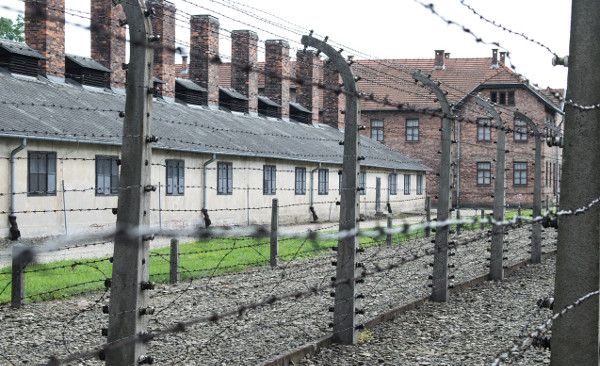
Commemorations and Remembrance
As you reflect on the atrocities of the Holocaust, it is important to consider how the phrase “Arbeit macht frei” is an integral aspect to Holocaust commemoration. Specifically, the Annual International Holocaust Remembrance Day and museum exhibits, including artefacts from Auschwitz play a critical role in remembrance.
International Holocaust Remembrance Day
Every year on 27 January, you observe International Holocaust Remembrance Day, commemorating the victims of the Holocaust and honouring those who survived. On this day, events take place worldwide, highlighting stories that remind us of the Nazi regime’s brutal history.
Auschwitz, where the notorious “Arbeit macht frei” sign is located, serves as a sombre backdrop for ceremonies that remind us of the importance of remembering the past.
Museum Exhibits and Artefacts
Museums play a vital role in preserving history through their exhibits. Artefacts from the Holocaust, such as the “Arbeit macht frei” sign, serve as a testament to the experiences of those who suffered.
In Auschwitz, which today is a State Museum, you find numerous exhibits displaying personal belongings of prisoners, providing tangible connections to history.
Read also:
This tangible heritage is essential for teaching future generations about the Holocaust’s grim reality and the critical lesson that such history should never repeat itself.
